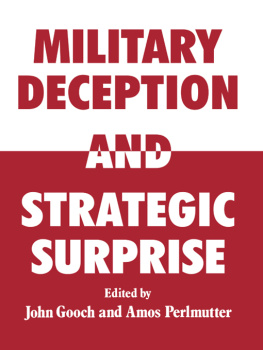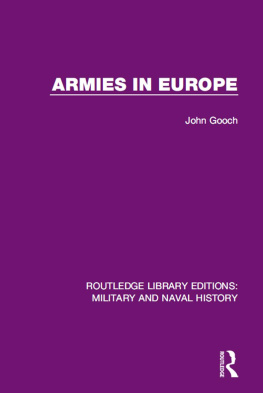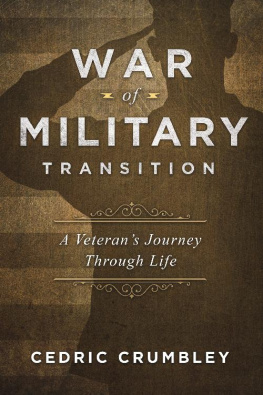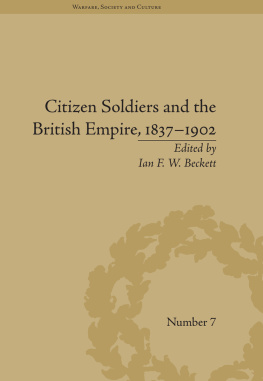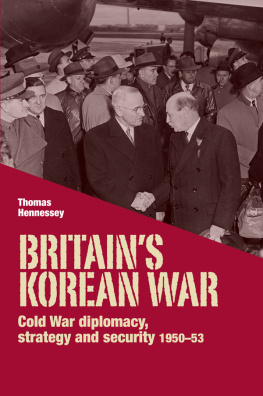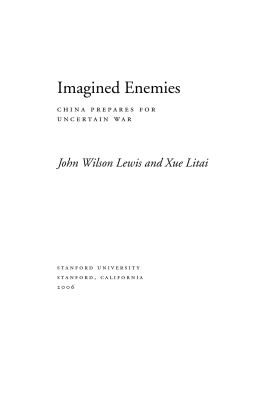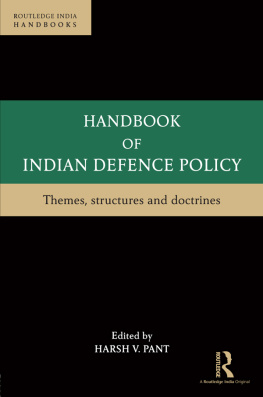First published in 1981 in Great Britain by
FRANK CASS AND COMPANY LIMITED
2 Park Square, Milton Park,
Abingdon, Oxon, OX14 4RN
and in the United States of America by
FRANK CASS AND COMPANY LIMITED
270 Madison Ave,
New York NY 10016
Transferred to Digital Printing 2006
Copyright 1981 John Gooch
British Library Cataloguing in Publication Data
Gooch, John
The prospect of war.
1. Great Britain - Military policy
2. Great Britain - History, Military - 19th century
3. Great Britain - History, Military - 20th century
I. Title
355.03 35 41 UA647
ISBN 0-7146-3128-0
All rights reserved. No part of this publication may be reproduced, stored in a retrieval system, or transmitted in any form, or by any means, electronic, mechanical, photocopying, recording, or otherwise, without the prior permission of Frank Cass and Company Limited.
Foreword
The essays collected together in this book deal, for the most part, with the two themes which have seemed to me the most significant and the most intriguing in the passage made by the military in Britain from the Victorian age to World War. The major theme is that of the transition of military strategy and policy from a preoccupation with the limited, though by no means undemanding, requirements of a sprawling empire in an age of diplomatic self-sufficiency to the enormous burdens of continental involvement in Europe against Germany, as the mass army replaced the capital fleet in the worlds military pecking order. This shift in emphasis, which took place on the eve of 1914, accompanied the move from so-called Splendid Isolation to involvement in a network of alliance and entente which both supported and restricted British foreign policy. Allied to this is the no less interesting story of the early evolution of the bureaucratic machinery of defence and the soldiers part in it, in peace and in war.
Britains acceptance of diplomatic links with Japan, with France and with Russia in the years between 1902 and 1907 was brought about chiefly by a combination of naval rivalry around the globe and heightening tension with Germany. Whilst diplomatic historians would not ascribe this shift solely some, not even chiefly to the latter factor, military historians have in considerable numbers, and mistakenly, done so. For them, the Agadir crisis of 19056 and the Anglo-French staff talks which followed it signalled a violent switch in military policy and the adoption by the General Staff of the continental strategy an anti-German stance which sprang fully-fledged into existence in 1906.1 This seems to me to be a gross over-simplification. The shift, in military policy as in foreign policy, was a gradual one fuelled by many causes and was not due simply to the malignant influence of the new men , satisfying though such an explanation may apparently be. Nor did the military agreements reached in the course of the discussions with France represent a permanent redirection of military policy, and still less a de facto alliance with France, and a moral obligation to fight at her side which bound Britain no matter what the circumstances which might lead France to war with Germany. They were technical agreements made to meet an immediate problem, only later over-loaded with significance which their participants did not recognize.2 Equally it will not do to argue a General Staff strategy an anti-German Eurocentric military strategy which was finessed into policy thanks to the manipulative skills and influence of the secretary of the governments forum for defence policy-making, the Committee of Imperial Defence, Sir George Clarke.3
For one thing, as will be seen, Clarke had extraordinarily little influence on policy given the potential of his position not least because his assertive personality made it impossible for him to adopt the self-effacing posture behind which a highly-placed defence bureaucrat could wield real influence witness the career of Sir Maurice Hankey. More fundamentally, as I have argued elsewhere, British military policy did not switch violently in 1906; it shifted gradually between 1896 and 1910 from preoccupation with invasion, by way of the massive problems of having to wage continental war outside Europe, to a concentration on Germany in Europe.4 The chapters which follow on Canada, on Haldanes army and on invasion are offered to support my position as a gradualist.
The soldiers who grappled with these problems were not malign, blinkered nor unduly xenophobic; they were honest, and often extremely able, men struggling as best they might with the limited resources at their command to provide their country with security, not just in present circumstances but in future ones on the likely nature of which they were offered little by way of guidance. When war enveloped them they did not leave their brains in the War Office and go off to practise blind butchery. Sir William Robertson came to realize all too clearly that military means could not achieve political objectives that were wildly unrealistic, and sought in vain to persuade the politicians of this view. Sir Frederick Maurice caught Lloyd George out in a piece of sharp practice which might have had disastrous results in the field; his subsequent actions demonstrated the truth of the dictum that soldiers meddle openly with politics at their peril. Since the outcome of all these episodes tended in various ways to confirm if it needed confirming the fact that Britains soldiers were at the service of her politicians, they had a value which deserves recording.
Notes
1. See, for example, N.DOmbrain, War Machinery and High Policy: Defence Administration in Peacetime Britain, 19021914, Oxford University Press 1973, pp. 1112, 58, 147,212.
2. Support for this view has just come to hand: Trevor Wilson, Britains Moral Commitment to France in August 1914, History, 64, 1979, pp. 38090.
3. J. McDermott, The Revolution in British Military Thinking from the Boer War to the Moroccan Crisis in P. Kennedy (ed.), The War Plans of the Great Powers 18881914, London, Allen and Unwin, 1979, p. 111.
4. John Gooch, The Plans of War: The General Staff and British Military Strategy c. 19001916, London, Routledge and Kegan Paul, 1974, pp. 16594.
Acknowledgements
originally appeared in the places indicated below, and are reproduced by permission.
Attitudes to War in Late Victorian and Edwardian England in B. Bond and I. Roy (eds.), War and Society: A Yearbook of Military History, London: Croom Helm 1975; Great Britain and the Defence of Canada 18961914 in Journal of Imperial and Commonwealth History vol. 3, 1975; Sir George Clarkes career at the Committee of Imperial Defence 19047 in Historical Journal vol. XVIII, 1975; The War Office and the Curragh Mutiny in Bulletin of the Institute of Historical Research vol. XLVI, 1973; Soldiers, Strategy and War Aims in the First World War in B. Hunt and A. Preston (eds.), War Aims and Strategic Policy in the Great War, London: Croom Helm 1977; The Maurice Case in Journal of Contemporary History vol. 3, 1968.
The author wishes to thank Viscount Esher, F. M. P. Maurice and Hector Monro, MP, for access to private papers; and Michael Howard, Brian Bond, Neil Summerton, Howard Moon and Michael Ekstein. A much fuller version of the latter part of will appear shortly in a volume to be edited by R. H. Whitworth.


